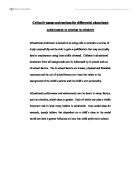Assess the sociological explanations for ethnic differences in educational achievement.
Asses the sociological explanations for ethnic differences in educational achievement. (20 marks)
According to the ethnicity department for education, there are major differences in levels of educational achievement between pupils of different ethnic minorities (EM) groups, the 2014 statistics say that Chinese and Indian children achieve the highest out of the rest of the EM groups.
There are both external and internal factors to explain ethnic differences in educational achievement.
One external factor is, in terms of social class, those from a Black Caribbean, Pakistani and Bangladesh (B/C, P, B) background are more likely to be from low-income households, experiencing poverty and unemployment and as a consequence this material deprivation means that they will be unable to provide their children with the books, tuition and nutritious diet to do well at school. Whereas, in contrast, those from an Indian and Chinese (I, C) background are less likely to be eligible for free school meals as they families are more likely to be professional business middle-class.
Another factor is Language which has also been examined as an indicator for differences in ethnic minority achievement. For many EM students, English is a second language and their difficulties in communicating may be viewed as a lack of ability by teachers. However, both Driver and Ballard and also Modood found that Asian and white students had a similar level of language development by the age of 16 with it only being a temporary disadvantage for Indian pupils.








